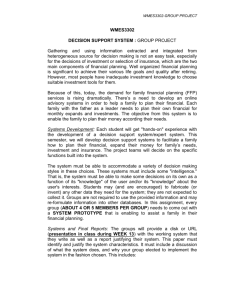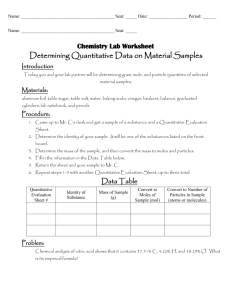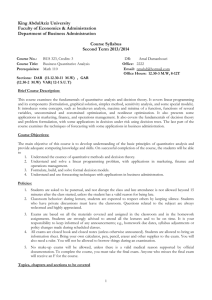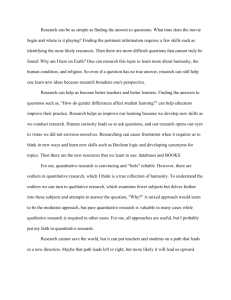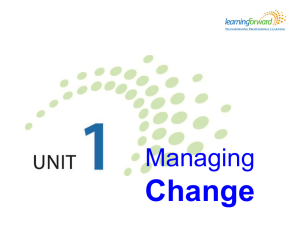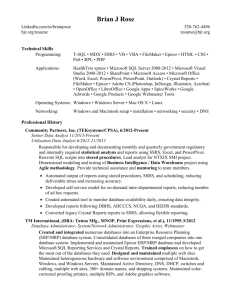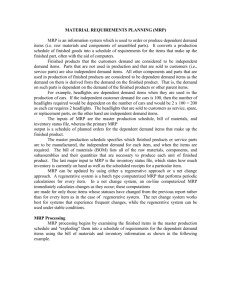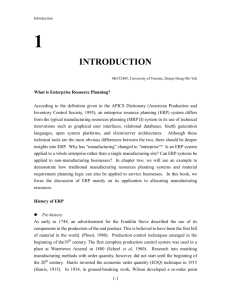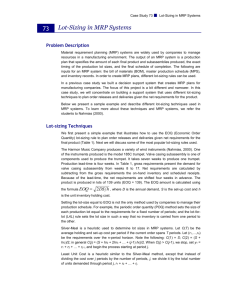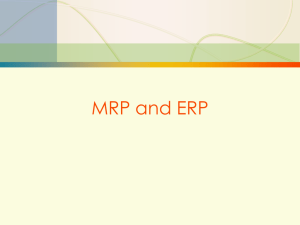examinations - Millersville University
advertisement
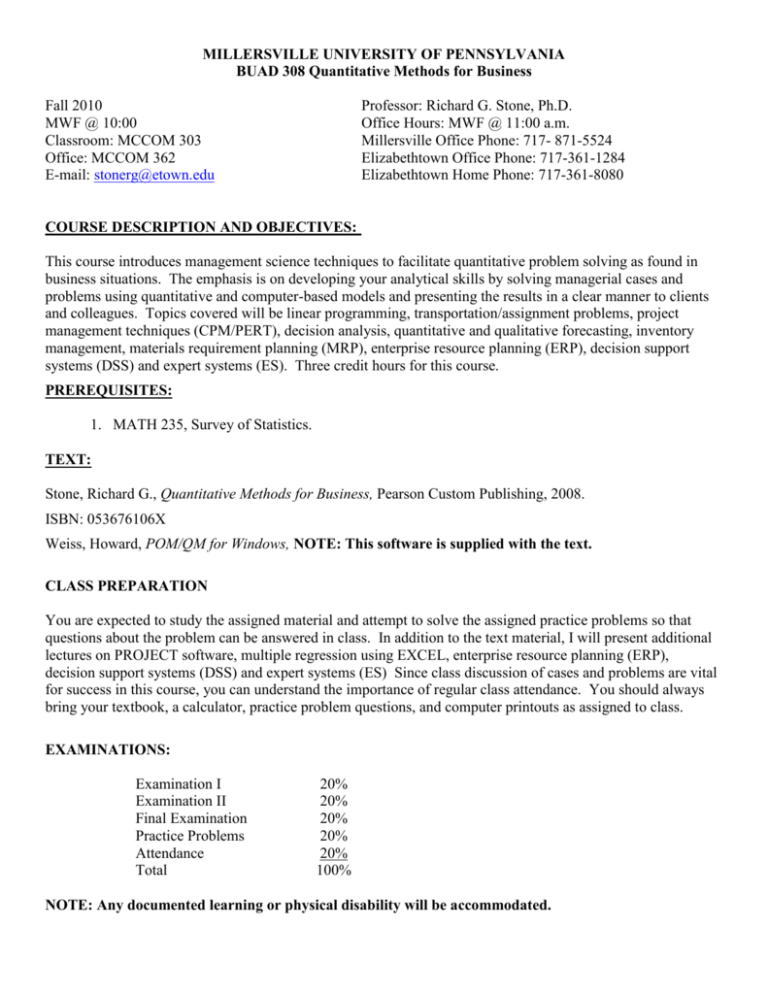
MILLERSVILLE UNIVERSITY OF PENNSYLVANIA BUAD 308 Quantitative Methods for Business Fall 2010 MWF @ 10:00 Classroom: MCCOM 303 Office: MCCOM 362 E-mail: stonerg@etown.edu Professor: Richard G. Stone, Ph.D. Office Hours: MWF @ 11:00 a.m. Millersville Office Phone: 717- 871-5524 Elizabethtown Office Phone: 717-361-1284 Elizabethtown Home Phone: 717-361-8080 COURSE DESCRIPTION AND OBJECTIVES: This course introduces management science techniques to facilitate quantitative problem solving as found in business situations. The emphasis is on developing your analytical skills by solving managerial cases and problems using quantitative and computer-based models and presenting the results in a clear manner to clients and colleagues. Topics covered will be linear programming, transportation/assignment problems, project management techniques (CPM/PERT), decision analysis, quantitative and qualitative forecasting, inventory management, materials requirement planning (MRP), enterprise resource planning (ERP), decision support systems (DSS) and expert systems (ES). Three credit hours for this course. PREREQUISITES: 1. MATH 235, Survey of Statistics. TEXT: Stone, Richard G., Quantitative Methods for Business, Pearson Custom Publishing, 2008. ISBN: 053676106X Weiss, Howard, POM/QM for Windows, NOTE: This software is supplied with the text. CLASS PREPARATION You are expected to study the assigned material and attempt to solve the assigned practice problems so that questions about the problem can be answered in class. In addition to the text material, I will present additional lectures on PROJECT software, multiple regression using EXCEL, enterprise resource planning (ERP), decision support systems (DSS) and expert systems (ES) Since class discussion of cases and problems are vital for success in this course, you can understand the importance of regular class attendance. You should always bring your textbook, a calculator, practice problem questions, and computer printouts as assigned to class. EXAMINATIONS: Examination I Examination II Final Examination Practice Problems Attendance Total 20% 20% 20% 20% 20% 100% NOTE: Any documented learning or physical disability will be accommodated. ACADEMIC INTEGRITY: Any violation of the University’s Academic Honesty Policy will be treated in accordance with the University’s guidelines without exception. PRACTICE PROBLEMS: I once had a brilliant student, now a well-known professor, who wrote a highly technical thesis. I asked him to assume that I was an ordinary corporate manager. Would he explain his thesis briefly? He went to the blackboard and began to cover it with mathematical symbols. I stopped him to remind him that I was an ordinary manager, not a mathematician. After a long pause he said, "I don't understand what I've done well enough to explain it in nontechnical language." Unless people can express themselves well in ordinary English, they don't know what they are talking about. --Management in Small Doses by Russell L. Ackoff (John Wiley & Sons) On the basis of the above quotation and in order to earn full credit, you need to follow these three steps: 1. 2. 3. Solve the problem correctly using a manual or computer solution method as required. Write a recommendation in clear English for an ordinary manager who has no knowledge of the model used. Write three or more limitations or assumptions of the model used that could cause your answer to be in error. ATTENDANCE: I will take attendance in class to learn each of your names as well to determine if your class absences are detrimental to your learning. Examinations are to be taken at the scheduled times with a policy of NO make-up exams except for documented cases of personal illness or emergencies. GRADING: Course Average: 95 – 100% 90 – 94 87 – 89 83 – 86 80 – 82 77 – 79 73 – 76 70 – 72 67 – 69 63 – 66 60 – 62 Less than 60 A AB+ B BC+ C CD+ D DF Class Absences 0 100% 1 95% 2 93% 3 88% 4 85% 5 82% 6 78% 7 75% 8 72% 9 68% 10 65% 11 60% TENTATIVE COURSE SCHEDULE Session Jan. 18 20 22 25 27 29 Feb. Mar. 1 3 5 Reading No Class None pp. 1 – 27 Linear Programming Computer-Based Linear Programming Julia’s Food Booth Case pp. 29 – 71 pp. 73 – 109 pp. 110 – 111 Interpreting Computer Solutions Linear Programming: Modeling Examples Formulation of LP Problems 9 – 11 Computer Printout pp. 113 - 151 pp. 153 – 154 Your responsibility! Be here! Formulate Equations Julia’s Food Booth, p.110-111 8 10 12 Project Management (CPM) pp. 333 – 351 Probabilistic Activity Times (PERT) pp. 352 – 359 Project Crashing and Time–Cost Trade-off pp.366 – 371 15 17 19 Review for EXAM I EXAM I Postmortem for EXAM I pp. 29-155&333-371 # 29, pp. 398, parts a. & b. pp. 29-155&333-371 Do well! pp. 29-155&333-371 Learn! 22 24 26 Decision Analysis Decision Trees Forecasting, Time Series Methods pp. 404 – 418 pp. 418 – 427 pp. 503 – 515 1 3 5 March 6 to 14 Apr. Topic Martin Luther King, Jr. Birthday Introduction to Course and Requirements What is Management Science? # 12, p. 154 # 10, p. 387 # 26, p. 450 MAD and Multiple Regression Forecasting pp. 521 – 543 POM/QM and EXCEL Forecasting pp. 533 - 540 #5, p. 545 Review for EXAM II pp.404-427&503-540 #44, p. 561 Use POM. SPRING BREAK NO CLASSES Sun, Ski, or Surf! 15 17 19 EXAM II Postmortem for EXAM II Inventory Management pp.404-427&503-540 IMPROVE! pp.404-427&503-540 Learn pp. 567 – 572 22 24 26 Basic EOQ Model EOQ with Production EOQ with Shortages pp. 573 - 579 pp. 579 – 582 pp. 582 - 586 29 31 2 EOQ Analysis on Computer Quantity Discounts Good Friday pp. 586 -587 pp. 587 - 591 NO CLASS Quantity Discount with QM Reorder Point and Safety Stocks Variable Demand and Lead Time pp. 591 -592 pp. 592 - 598 pp. 598 – 6 5 7 9 # 6, p. 602-603 # 30, p.606 & 607 May 12 14 16 Materials Req. Planning (MRP) An MRP Application Computer Based MRP pp. 613 - 621 pp. 621 – 638 Computer Demonstration 19 21 23 Enterprise Resource Planning (ERP) Enterprise Resource Planning (ERP) Lean Operations and JIT pp.638 – 642 & Lecture Chapter 14 Handout Chapter 15 Handout 26 28 30 Decision Support Systems (DSS) Expert Systems (ES) Quantitative Methods in your career DSS Handout ES Handout Class Discussion Review for FINAL pp. 567 – 642 & Handouts 3 MRP Handout Prob. Final Exam Schedule Friday, May 7, 2009 BUAD 308.0 8:00 to 10:00 am Enjoy Your Summer! MCCOM 303


